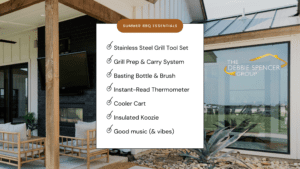Vibe: Cozy Winter Cabin
Transform your home into a winter haven and create an idyllic cabin-in-the-woods atmosphere with this step-by-step checklist.
Set the Stage
• Cozy candles – Try Woodwick candles if you like the flickering light + crackling pops.
• Chunky blankets – Add texture and warmth with plush throws, heirloom quilts, or a blanket the whole family can share from The Big Blanket Company.
• Featured fireplace – Don’t have the real thing? No worries—find a fireplace video on YouTube for that comforting ambiance.
• Smooth jazz – Set the mood with Spotify playlists that capture the season’s essence.
Elevate the vibe
• Classic board games – Every cabin in the woods has a cabinet of classic board games like Scrabble, Checkers, Sorry, or Scategories.
• Rocking chairs – Nothing says “Welcome to our Cabin” like rows of rocking chairs. If you have one or more in other rooms, bring it to the living from for the holiday season.
Dress the Part
Make a statement with a pair of fleece-lined slippers from UGGS or LLBean and comfy loungewear with a stocking hat to match. (For the ladies, check out Vuori’s Douglas Cashmere & Merino Beanie Hat!)
Indulge in Comfort Food (and Drink!)
• Soups, stews, and chowders hit the cozy cabin bill. Need some inspo? Search for Martha Stewart’s Vegetable Bean or Potato, Broccoli, and Cheddar Soup.
• Top off your cabin-inspired meal with a fresh-baked apple pie and hot cocoa. Crow & Moss Honduras Wampusirpi Drinking Chocolate is a top pick for dark chocolate lovers, but if you’re looking for something nostalgic, Swiss Miss Milk Chocolate Hot Cocoa Mix is your best choice.
• Or skip the hot chocolate altogether and go straight for the Jingle Juice—a merry blend of Cran-Apple Juice, Red Moscato, Prosecco, Vodka, and frozen cranberries.
If you’re going for cabin cozy, why not go all the way? Enjoy, friends, and from my home to yours, once again, happy holidays!
Source:
22 Winter Soups That Will Keep You Cozy
Easy Apple Pie Recipe (Just like Grandma Made!) – Little Spoon Farm
We Tasted Every Instant Hot Chocolate We Could Find — Here Are the Best
| DEBBIE SPENCER GROUP |
| REALTOR®, CRS, SRES |
| m: 617-285-7300 t: 781-860-7300 e: debbie@thedebbiespencergroup.com |
| 1 Militia Drive, Suite 204, Lexington, MA 02421
|











